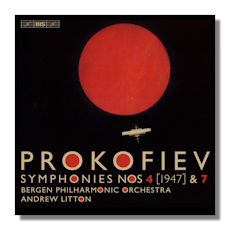
The Internet's Premier Classical Music Source
Related Links
- Prokofieff Reviews
- Latest Reviews
- More Reviews
-
By Composer
-
Collections
DVD & Blu-ray
Books
Concert Reviews
Articles/Interviews
Software
Audio
Search Amazon
Recommended Links
Site News
 SACD Review
SACD Review
Serge Prokofieff

- Symphony #4 in C Major Op. 112 (Revised Version)
- Symphony #7 in C Sharp minor, Op. 131
Bergen Philharmonic Orchestra/Andrew Litton
BIS SACD-2134 81:58 Hybrid Multichannel
This is the third album in Andrew Litton's ongoing series devoted to the complete symphonies of Prokofiev. I reviewed his account of the Fifth (coupled with the Scythian Suite) here in 2015 (BIS SACD-2124) and found it excellent. I missed his first entry in the series, the Sixth Symphony (with suites from Lt. Kije and The Love for Three Oranges) but I did manage to hear it and found it also very convincing. The sound reproduction throughout the series is very vivid and well balanced, though in this new issue I found the timpani and bass drum to have a boomy quality in the Fourth but not so much in the Seventh. That is the only drawback in the otherwise excellent engineering on this disc.
Litton's Fourth features fairly centrist tempos in all four movements, though the second is a bit on the expansive side, which is not a bad thing. He is fairly close in his approach to Ormandy in his pioneering 1960 recording for Columbia, not least because the tempos are nearly identical in each of the movements. Also, Litton, like Ormandy, employs wood blocks at the climax of the finale, when the big first movement main theme returns. This suggests that Litton may have been familiar with that Ormandy effort and even an admirer of it, since wood blocks are used in the first movement and not called for by Prokofiev in the finale. To my knowledge only Ormandy and Litton have added this little touch.
At any rate, Litton views the Fourth as an epic work whose lyricism is lush and whose wit and energy effervesce with color and all the character you could want. The two climaxes in the first movement feature spirited playing and plentiful detail, and the second movement is utterly lovely, but also epic in the sweeping power of its unforgettable ending which features a gorgeous tutti version of the main theme. The third movement is witty and colorful in Litton's hands and the finale is, as it should be, all over the place, from causing hair-raising menace and playful joy, to bursting with energy and finally settling into fateful magnificence. This is a version of this still underrated symphony to rank with the best efforts from Ormandy, Alsop and Kitayenko.
Litton's Seventh is essentially just as good. This is a subdued and elegiac work, rather straightforward in its expressive language. It was originally intended to be a composition for younger audiences – a sort of Peter and the Wolf symphony. But it grew too complicated to fit that category though still went on to achieve some success: for many years it was the third most popular of the seven symphonies by Prokofiev, the First and Fifth being the most popular. Now the Third and Sixth, and maybe even the Fourth, are gaining attention each passing year. Actually, the intractable Second is even drawing notice now. For the Seventh, Litton once again chooses centrist tempos, although the first movement is slightly on the expansive side. That's all to the good because the most successful versions of this movement seem to be the longer ones. The lyricism under Litton is full of emotion and drama, the strings soaring to the heavens, especially in the beautiful alternate theme. The Scherzo is colorful and joyful, but in the alternate theme filled with mystery and omen. The third movement is by turns lyrical and perky, as it should be, and the finale moves so deftly from balletic wit and celebration in its first half to just about the most ecstatic nostalgia imaginable. Litton captures it all with passion and commitment. By the way, he includes both the original and alternate endings, in both cases offering a full performance of the movement. This is a great Seventh to rank with the recent excellent account by Gaffigan on Challenge Classics, as well as with the past versions by Kitayenko, Previn and Tennstedt.
While Litton as an interpreter has been impressive in every symphony so far, give some credit to his splendid Bergen orchestra and the BIS recording team for their fine support in helping to make this series highly competitive with the plentiful competition, which includes four other on-going or recently completed Prokofiev symphony cycles, by Alsop/Naxos, Gergiev/Mariinsky, Gaffigan/Challenge Classics and Karabits/Onyx, the latter being the one newly completed effort. There were already a dozen or so previous cycles in the catalog, half of which are still readily available and they include, by order of preference, Kitayenko (Capriccio), Gergiev (Decca), Jarvi (Chandos), Rozhdestvensky (Melodiya), Kuchar (Naxos) and Ozawa (DG). Collectively, where does Litton rank against all comers?
Well, things are getting complicated, but so far he can stand with the very best of the newer and older versions. Litton understands Prokofiev, grasps every aspect of his complex musical persona, and can obtain the performance he envisions from his orchestra. You can hardly ask more of a conductor. If you're a Prokofiev maven or someone with an interest in 20th century symphonies, this recording is simply a must. By the way, I must draw your attention to the heading where you'll notice the extraordinary timing of this disc – 81:58, the most music I have ever personally encountered on a single CD or SACD. Urgently recommended!
Copyright © 2016, Robert Cummings


















